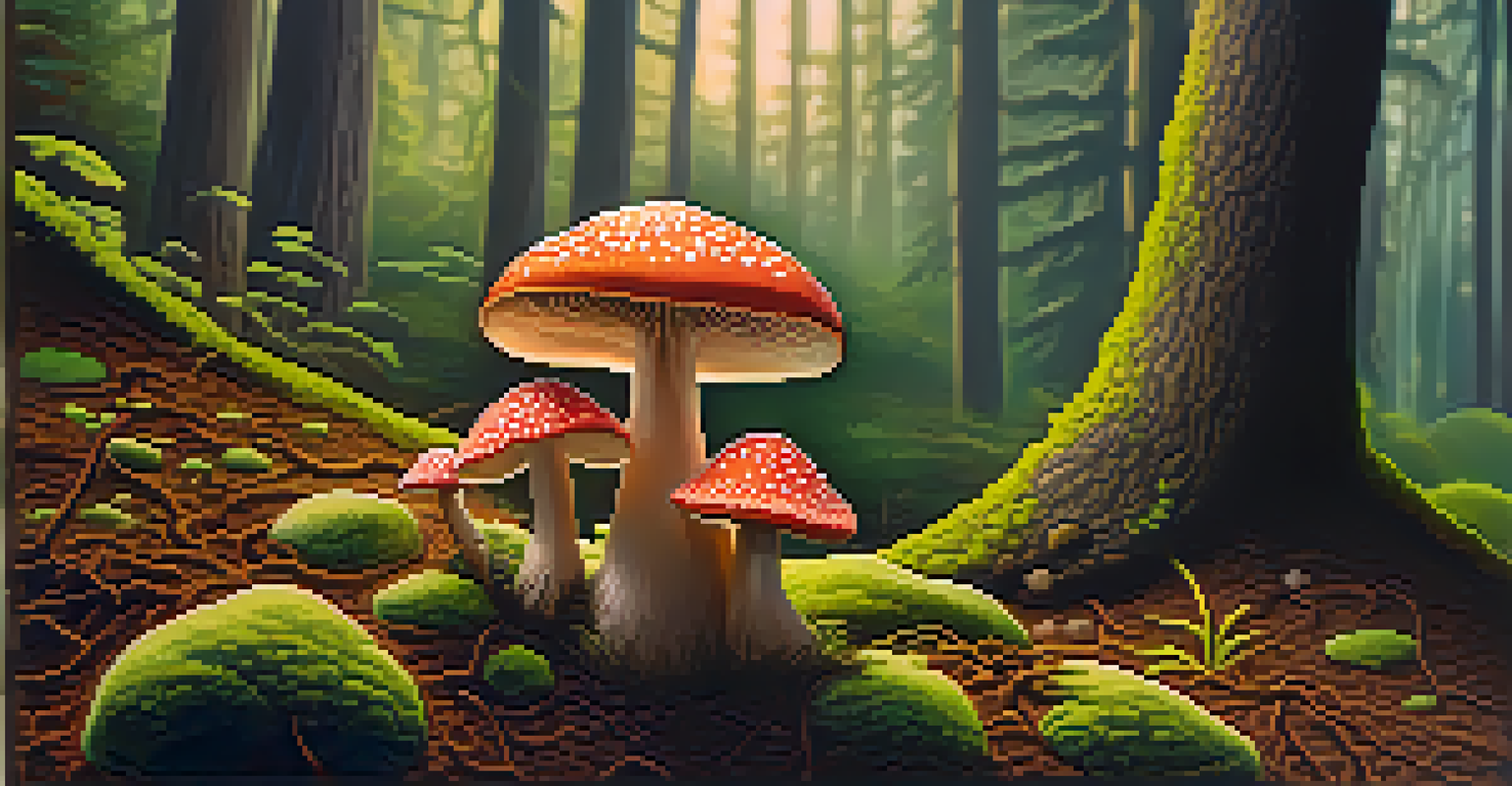The Legal Status of Entheogens: A Global Overview in 2023

Understanding Entheogens: What Are They?
Entheogens are substances that induce spiritual or mystical experiences, often derived from plants or fungi. Common examples include psilocybin mushrooms, peyote, and ayahuasca. These substances have been used for centuries in various cultures for healing and religious ceremonies, providing a profound connection to the human experience.
The use of entheogens is a powerful tool for personal and societal transformation.
In recent years, there has been a resurgence of interest in entheogens, not just for their psychoactive properties but also for their potential therapeutic benefits. Research is uncovering how substances like psilocybin can aid in treating conditions such as depression and PTSD. This growing interest is prompting discussions around their legal status in numerous countries.
Related Resource
Understanding what entheogens are and their historical significance is crucial as we explore their current legal frameworks. This foundation allows us to appreciate the complexities involved in regulating substances that have been integral to human culture for millennia.
Current Legal Status in North America
In North America, the legal landscape for entheogens is rapidly changing. In the United States, several states and cities have decriminalized or legalized the use of substances like psilocybin and ayahuasca, often for therapeutic purposes. For instance, Oregon has taken a bold step by legalizing psilocybin therapy, paving the way for regulated use.

However, the legal status can vary significantly even within states, with some cities like Denver and Oakland leading the charge in decriminalization. This patchwork of laws creates confusion for users and practitioners alike, highlighting the need for clearer regulations as interest in entheogens grows.
Entheogens Induce Spiritual Experiences
Entheogens, derived from plants and fungi, have been historically used for spiritual and therapeutic purposes, highlighting their profound impact on human culture.
As we look to the future, North America may serve as a model for how entheogens can be integrated into mental health care, but it also raises important questions about safety, ethics, and access. The evolving legal framework could influence how these substances are perceived and utilized in society.
Legal Perspectives in Europe: A Mixed Bag
Europe presents a diverse legal landscape for entheogens, with some countries embracing their use while others maintain strict prohibitions. The Netherlands, for example, allows the sale of psilocybin truffles, making them accessible to those seeking therapeutic experiences. This has led to a burgeoning psychedelic tourism sector, attracting individuals from around the world.
Psychedelics can help us to understand the mind and the nature of consciousness.
Conversely, countries like Sweden and Finland have stringent laws against entheogens, often treating them as illegal narcotics. This inconsistency can create challenges for researchers and users alike, as they navigate the legal gray areas of entheogen use in various countries.
Related Resource
The ongoing dialogue in Europe surrounding entheogens often centers on their potential benefits for mental health and spirituality. As more studies emerge, there is hope that legal frameworks will evolve to reflect the growing body of evidence supporting their safe and beneficial use.
Entheogen Legislation in South America
In South America, the legal status of entheogens is often tied to indigenous practices and cultural heritage. Countries like Peru and Brazil have recognized the importance of ayahuasca in traditional healing and spiritual ceremonies, allowing its use in these contexts. This recognition often comes with regulations to ensure that cultural practices are respected and preserved.
However, the rise in popularity of ayahuasca retreats has sparked concerns about exploitation and commercialization. Some governments are grappling with how to manage this growing industry while protecting indigenous rights and practices. As a result, legislation is being considered to regulate the use of entheogens in a way that honors their cultural significance.
Evolving Legal Landscape for Entheogens
The legal status of entheogens is rapidly changing across North America and Europe, with some regions embracing their therapeutic potential while others maintain strict prohibitions.
The ongoing legal discussions in South America highlight a delicate balance between modern interests and ancient traditions. As more people seek these experiences, it becomes crucial to ensure that the rights of indigenous communities are respected in any legal framework.
Asia's Approach to Entheogens: Caution and Control
In Asia, the legal status of entheogens is often marked by cautious regulation and control. Countries like India and Nepal have long histories of using substances like cannabis and psilocybin in spiritual practices. However, recent decades have seen stricter laws as governments aim to combat drug trafficking and abuse.
For example, while some traditional practices continue, the legal frameworks surrounding entheogens remain ambiguous and restrictive, making it challenging for researchers to explore their potential benefits. This cautious approach can stifle progress in understanding the therapeutic uses of these substances.
Related Resource
As the global conversation around mental health and wellness continues to evolve, there is potential for Asian countries to revisit their stance on entheogens. By balancing tradition with modern scientific understanding, these nations can contribute to a more nuanced dialogue on the benefits and risks of entheogen use.
The Role of Research in Shaping Entheogen Laws
Research plays a pivotal role in shaping the legal status of entheogens worldwide. As studies uncover the therapeutic benefits of substances like psilocybin and MDMA, lawmakers are increasingly forced to reconsider existing prohibitions. For instance, the FDA has granted breakthrough therapy designation to psilocybin for treating depression, signaling a shift in how these substances are viewed.
In many countries, including the United States and Canada, research findings are driving public sentiment towards more progressive policies. As the stigma surrounding entheogens diminishes, there is a growing recognition of their potential to address mental health crises, particularly in the wake of the COVID-19 pandemic.
Research Drives Legal Reconsideration
Ongoing research into the therapeutic benefits of entheogens is prompting lawmakers to reevaluate existing restrictions and consider more progressive policies.
However, the challenge remains to ensure that research is conducted ethically and responsibly. As the legal landscape continues to evolve, it is essential that researchers, lawmakers, and communities work together to create a framework that prioritizes safety and accessibility.
Future Trends in Entheogen Legislation
Looking ahead, the future of entheogen legislation appears promising, with many advocates pushing for more inclusive and flexible laws. As public interest grows, more states and countries may consider decriminalizing or legalizing entheogen use, especially for therapeutic purposes. This shift could lead to a paradigm change in how mental health is approached globally.
The success stories from places like Oregon and the Netherlands may inspire other regions to follow suit, sparking a broader conversation about personal freedom and the right to access these substances. Moreover, the integration of entheogens into conventional mental health treatment could revolutionize care for millions suffering from various mental health conditions.

However, it is crucial that the movement toward legalization is approached thoughtfully, taking into account public safety, ethical considerations, and the protection of marginalized communities. As we navigate this evolving landscape, a collaborative effort will be key to ensuring that the benefits of entheogens are realized responsibly.